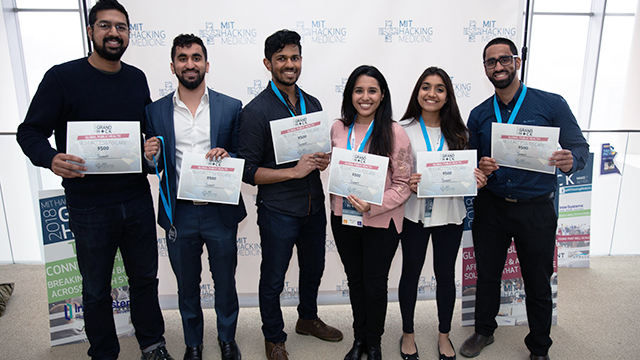
What is the MIT Grand Hack?
Abdullah: The MIT Grand Hack is a student organized hackathon in the area of health care. A hackathon brings together people from different disciplines to work on problems. Typically the solutions are technology-oriented; you'll have physicians, scientists, software developers, designers and data scientists all coming together to work on specific problems. People pitch their ideas at the beginning of the event and form teams based off of the problems. You have 48 hours to rapidly prototype a solution, and you pitch it at the end to a panel of judges. The MIT Grand Hack is one of the biggest health hackathons in the world.
How did you get involved?
Abdullah: Actually, I just found it on Facebook and realized it would be of interest to me, since I am interested in applying technology to health care. My brother was completing his master's program in public health at Harvard at the time, I told him to apply as well since it would also give me an excuse to go to the area. We applied to the global health track and both of us got in.
What was the problem you wanted to address?
Abdullah: We were looking at non-communicable diseases like diabetes and hypertension. My brother ended up pitching for us, first day, to gauge interest. Our initial plan was to do a project about adherence and see how we could use technology to improve adherence to medication and lifestyle interventions. There was a lot of interest from clinicians and developers, so we formed a team based on that.
What was the process like?
Abdullah: We used a process used by designers called design thinking, which allows you to come up with a user-centred approach to a problem. It lets you determine what the user wants, and then you rapidly iterate through solutions to come up with the best one.

We also had mentors available including industry leaders and people with lived experience with diabetes, which was a really important resource for us. After talking to them and hearing that a problem they have is keeping all of the information they needed, we decided to make a tool for newly diagnosed diabetics. The tool would help them manage their disease better and keep track of the data they're interacting with. We thought it would be cool to create a chatbot that could be implemented on Facebook Messenger, Whatsapp or just over text. The user could ask the chatbot question and the chatbot would answer them for the user.
We worked on it for a full day and I pitched at the end. We won a prize for Best Access to Healthcare.
What was it like working with your brother?
Abdullah: Even though we are both involved in health care, this was out first time working together. I really enjoyed it and thought we had good chemistry and delegate tasks well. He is in his residency now, so he had a lot more knowledge of patient care.
Ameer: Oh, it was the icing on the cake. It was so much fun. We played off each other's strengths a lot.
What was the best part of the Grand Hack?
Ameer: It was such a short period of time, but we generated so many great ideas. We iterated really rapidly. The fast-paced nature of it and working with people we'd never met before was amazing. It was also pretty neat to be at MIT. I mentioned the MIT Grand Hack in an article I wrote for the Canadian Medical Association Journal.
How did it change your perception of the U of A?
Ameer: There are so many interesting things going on at the U of A, and really cool research. When you go down to places like Boston to these very prestigious schools, you realize it's just a lot of smart people working together. And we have that at the U of A, there's nothing too daunting that can't be done here.
The brothers continue their work to develop the chatbot. Abdullah will be going to the California Institute of Technology to pursue a PhD in synthetic biology and will return to finish his MD. Ameer is a fourth-year general surgery resident at the University of Calgary.